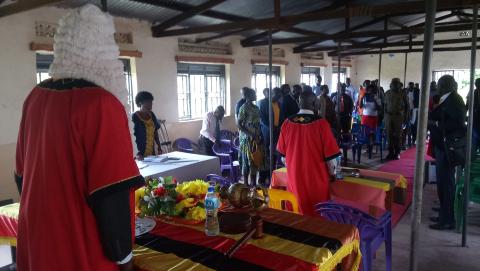Maracha District budgets UGX 36.4 billion for next financial year

Maracha District Local Government intends to spend Ugx 36.4 billion in the fiscal year 2025/26 to deliver social services to the residents in line with the country’s Vision 2040.
The district council on Thursday, May 29, 2025, approved program allocations— Ugx 26 billion for the Human Capital Development program, Ugx 1.6 billion towards the Agro-Industrialization program, Ugx 1.6 billion for the Integrated Transport Infrastructure and Services program, Natural Resources, Environment, Climate Change, Land and Water Management program was allocated Ugx 240 million, Private Sector Development program Ugx 63 million.
In other program allocations, Public Sector Transformation program will receive 4.9 billion, Ugx 1 billion will go to the Governance and Security program, Regional Balanced Development program will get Ugx 130 million, Development Plan Implementationprogram will receive Ugx 333 million, Private Sector Development program is allocated Ugx 63 million and the Tourism Development program is appropriated Ugx 21 million.
Maracha District Chairperson, Hon. Stephen Obitre, while commending the council for approving the budget without any friction, decried the low funding that will target the communities, most of the monies will go into wages and payment of gratuity and pension.
Hon. Obitre argued for the decentralization function to be fully realized higher local governments should be given more allocation of the national budget to meet the expectations of the communities, which he said could change if the country starts producing oil.
Hon. Obitre raised a red flag that the district will likely return funds under pension due to the difficulties in migrating some retirees from the old system of payroll management, Integrated Personnel and Payroll System (IPPS), to the new system Human Capital Management (HCM) which is occasioned by inconsistences in personnel details.
“There is that shift from IPPS to Human Capital Management, there has been reforms in human resource, most of our pensioners were in Arua (District), the challenge is some of their current details differ, they differ from the details that were captured when they entered service. The current system has refused to capture many of them,” he noted.
In the new budget, the district building committee has been allocated Ugx 18 million from the Ugx 8.5 million in the current financial year, the Chairperson Finance, Planning and Administration Committee, Hon. Grace Asibazuyo stated the building committee if effectively facilitated to carry out its mandate will in return generate a lot of local revenue for the district.
The District Engineer, Eng. Timothy Ezati said the activities of the building committee are regularly assessed by the National Building Review Board (NBRB) and appealed for the council to allocate funds that will propel the committee to deliver to the demands of the regulating authority.
“We have a sensitization meetings with all the councilors, lc3 chairpersons, we would have radio talk shows one per quarter, we also have committee meetings, these committee meetings are mandatory, the National Building Review Board will come to assess the number of meetings, what they deliberated on?, how many building permits were issued?,” he said.
The Chairperson Works and Technical Services Committee, Mr. Paul Chwa emphasized that most communities are yet to get familiar with the operations of the building committee, calling for patience in the demands placed on the committee.
“We have seen this as an easy of raising revenue, we are yet introducing it to the people and we are yet building the capacities of the implementers,” he said.
The Social Services Committee recommendation the 18 heath facilities in the district allocate funds quarterly to functionalize the ambulance to handle emergencies was endorsed by the councilors. The health center IIs will contribute Ugx 100,000, health center IIIs Ugx 150,000 meanwhile Maracha Health Center IV and St. Joseph Hospital-Maracha will each contribute Ugx 200,000 quarterly.
The Chairperson Social Services Committee, Hon. William Drimbaku said the proposal was arrived at after wide consultations with health sector stakeholders including health facility in-charges therefore there will be no lukewarm response.
“As we have not been budgeting for this money but some of these facilities have been giving this money and even adding more to the ambulance to help emergency cases, which means that they had started only that some facilities don’t comply we have made it compulsory so that every facility contributes,” Hon. Drimbaku assured council.
Maracha District Health Officer, Dr. Paul Onzubo said for three years the district did not register any case of an expectant mother dying due to the responsive emergency services majorly supported by implementing partners who are withdrawing following reduction in their funding. Dr. Onzubo added the health facilities will not be much burdened with fueling the ambulance for emergencies since most of the funding in the sector will go to the lower health structure.
“With the financial landscape abroad things are not very good at all, many partners are likely not to comeback, the increases in PHC (Primary Health Care) and what they call Result Based Financing we have taken resources to the lower levels,” he remarked.
The Deputy Speaker, who chaired the session, Hon. Adrian Drakana dismissed social media reports that councilors had allocated themselves money to procure suits stating Ugx 2 million shillings was allocated towards the purchase of corporate shirts as souvenirs for the leaders to end their term of office.
“We never passed Ugx 36.4 billion for t-shirts, only Ugx 2 million out of Ugx 36.4 billion, I want to refute that it is not that we are passing big money for suits,” he said.
Maracha Deputy Resident District Commissioner, Ms. Monica Kotevu mobilized communities to participate in the national ID mass registration exercise and renewal underlying it is importance especially to communities that have been failing to access government programs due the lack of national IDs.
The sources of funding for the budget include locally raised revenues Ugx 861 million, discretionary government transfers Ugx 3 billion, conditional government transfers Ugx 29 billion, other government transfers Ugx 703 million, and external financing Ugx 961 million.
